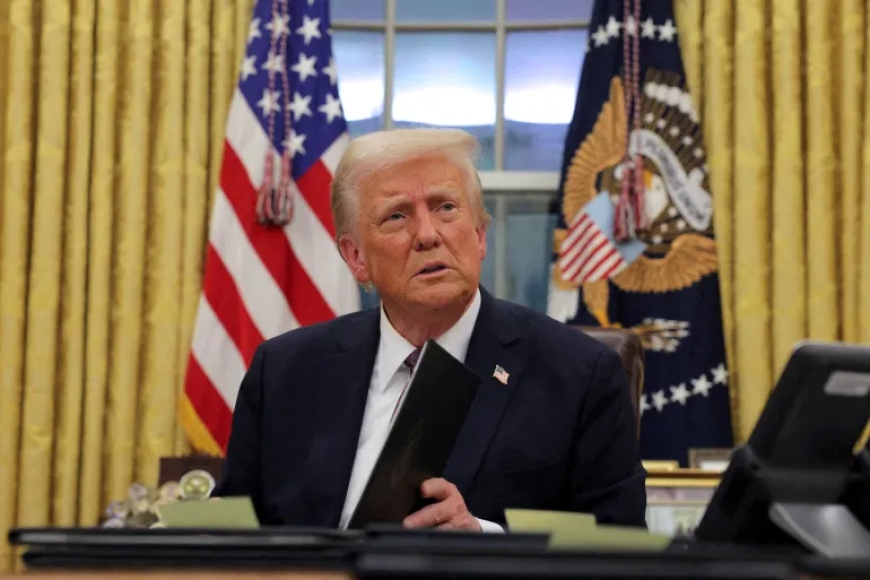How Your Social Media Post Will Now Deny You US Visa
The U.S. Citizenship and Immigration Services (USCIS) will, from Wednesday, April 9 will begin social media screening as part of its visa and immigration vetting process.

Kenyans seeking to live or study in the United States (US) will now have to do some kind of audit on their social media posts, as specific ones could now see them be denied a visa, the US government has announced.
In yet another controversial policy by President Donald Trump's government, the U.S. Citizenship and Immigration Services (USCIS) will, from Wednesday, April 9 will begin social media screening as part of its visa and immigration vetting process.
Antisemitic behavior on social media and physical harassment of Jewish individuals will now be taken into consideration when evaluating immigration benefit applications.
This policy will immediately impact applicants for green cards, international students, and individuals tied to schools involved in antisemitic activity.

US President Donald Trump at his office in the White House. /AL JAZEERA
"Today, U.S. Citizenship and Immigration Services (USCIS) will begin considering aliens’ antisemitic activity on social media and the physical harassment of Jewish individuals as grounds for denying immigration benefit requests," stated the USCIS in part.
"This will immediately affect aliens applying for lawful permanent resident status, foreign students and aliens affiliated with educational institutions linked to antisemitic activity."
This move aligns with executive orders issued under President Trump focused on fighting antisemitism and protecting national security.
The Department of Homeland Security (DHS) says it will strictly enforce immigration laws to block extremists, including those who support antisemitic terrorism or groups like Hamas, Palestinian Islamic Jihad, Hezbollah, and the Houthis.
DHS Assistant Secretary for Public Affairs Tricia McLaughlin stated that there’s no place in the U.S. for people who sympathize with terrorist causes and warned that anyone advocating antisemitic violence while trying to claim protection under free speech rights won’t be allowed in the country.
“There is no room in the United States for the rest of the world’s terrorist sympathizers, and we are under no obligation to admit them or let them stay here,” said McLaughlin.
“Sec. Noem has made it clear that anyone who thinks they can come to America and hide behind the First Amendment to advocate for anti-Semitic violence and terrorism – think again. You are not welcome here.”
Under this new policy, USCIS will treat any social media activity showing support for antisemitic terrorism or groups as a negative factor during the immigration review process. This policy has since taken effect.
No country is off the hook under this new sweeping U.S. policy — and Kenyans could feel the impact in a big way, especially since America remains a top destination for education, work, and permanent residency.
The rollout comes as global tensions flare over the ongoing Israel-Gaza conflict. U.S. officials say the goal is to block individuals with extremist or antisemitic views from entering the country, following a string of violent incidents linked to such ideologies.
Already, the State Department has revoked hundreds of student visas for people accused of supporting extremist groups or making antisemitic remarks. U.S. Secretary of State Marco Rubio confirmed over 300 student visas have been cancelled, calling some of those affected "lunatics."
For Kenyan students and immigrants, this adds another layer of difficulty to the already tough U.S. visa process. And while Kenya enjoyed a somewhat favorable relationship with the Trump administration, the new president appears committed to enforcing his policies strictly — even if that means some allied nations get caught in the crossfire.
This directive also comes just weeks after news broke that the U.S. would step up its scrutiny of visa applicants' social media. A policy originally introduced in 2009 now requires applicants to hand over usernames for all platforms used in the past five years, plus any old email addresses and phone numbers.
Under Trump’s proposed expansion, the social media vetting will apply to nearly all visa types, including diversity lottery, work, student, and tourist visas. Platforms under the microscope include Facebook, Twitter, Instagram, LinkedIn, and more.
All this personal data will be stored indefinitely by U.S. authorities and can be shared across multiple government agencies.







